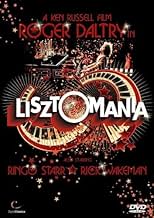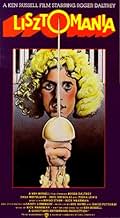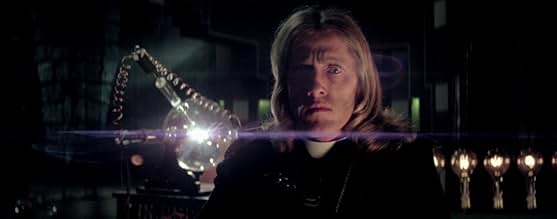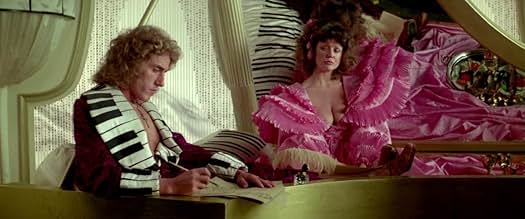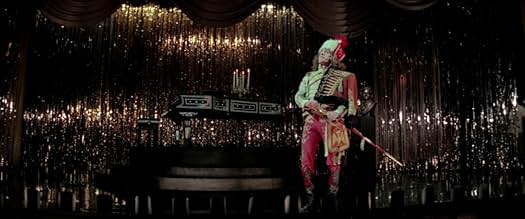AVALIAÇÃO DA IMDb
6,1/10
3,3 mil
SUA AVALIAÇÃO
Adicionar um enredo no seu idiomaComposer and pianist Franz Liszt (Roger Daltrey) attempts to overcome his hedonistic life-style while repeatedly being drawn back into it by the many women in his life and fellow composer Ri... Ler tudoComposer and pianist Franz Liszt (Roger Daltrey) attempts to overcome his hedonistic life-style while repeatedly being drawn back into it by the many women in his life and fellow composer Richard Wagner (Paul Nicholas).Composer and pianist Franz Liszt (Roger Daltrey) attempts to overcome his hedonistic life-style while repeatedly being drawn back into it by the many women in his life and fellow composer Richard Wagner (Paul Nicholas).
Avaliações em destaque
Franz Liszt (Roger Daltrey) is a hedonistic composer in old Europe. In real life, the Hungarian musician lived from 1811 to 1886. Richard Wagner is a music associate. Ringo Starr plays The Pope.
This is surrealistic biopic. It can be seen as a mess, self-indulgent, and undecipherable. It can also be seen as intriguing and challenging. I choose to see it as the later. It's definitively not safe. I prefer a mess more than an uninteresting bland biopic. As an actor, Daltrey is not that great but his rock star personality is undeniable. Ken Russell is throwing a lot into this. It's a lot and it runs a bit long. I wish it wraps up a little sooner. Wagner needs to have more scenes as the antagonist. I would also like a bigger better actor playing him. He doesn't have to be a real musician. All in all, this is at least interesting.
This is surrealistic biopic. It can be seen as a mess, self-indulgent, and undecipherable. It can also be seen as intriguing and challenging. I choose to see it as the later. It's definitively not safe. I prefer a mess more than an uninteresting bland biopic. As an actor, Daltrey is not that great but his rock star personality is undeniable. Ken Russell is throwing a lot into this. It's a lot and it runs a bit long. I wish it wraps up a little sooner. Wagner needs to have more scenes as the antagonist. I would also like a bigger better actor playing him. He doesn't have to be a real musician. All in all, this is at least interesting.
A wild, surreal, profane, provocative, bawdy, debauched, baroque, rock n' roll pop musical fantasy with anachronistic abstractions, Chaplin references and a depiction of the Golem as a lumbering Nazi Frankenstein wreaking havoc amidst a soundtrack of Wagnerian dread. Suffice to say, Lisztomania (1975) is as far from conventional cinema as you could possible get, illustrating Russell's further shift into more self-indulgent territory and away from his more sensitive earlier work with films such Elgar (1962), The Debussy Film (1965), Delius; Song of Summer (1968) and the controversial Women in Love (1969). The seeds of Lisztomania can be seen in many of these films, in particular, in Russell's fairly unique way of seeing the past by way of the present; investigating historical figures, writers, artists and composers as if modern-day pop icons. Here, Russell takes that notion and applies it to an incredibly distinctive visual perspective that attempts to underpin the spiralling confusion of the artist's life and work in such a way as to be just as stimulating and sensory for the audience as it is for the character himself.
The style that Russell employs on Lisztomania is characteristic of the mid-to-late period of his career, featuring cluttered cinemascope compositions, a juxtaposition of various film speeds, colours and textures, a general mix of established actors, pop-stars and amateurs, a complete disrespect for the artist and their work, for the period in which the film is set and for the general accepted conventions of traditional, biographical film-making. Personally, I welcome the sense of anarchy; with Russell getting away from the clichés that ultimately lead to films like Ray (2004) and Walk the Line (2005) and presenting a film that is - for better or worse - completely unique. Once again, the approach that Russell adopts for Lisztomania can be seen in many of his preceding films, going as far back as his ultimate masterpiece The Devils (1971); a gloriously over-the-top, pop-art inspired political horror story with a fitting subversion of various religious iconography. This led on to his film about the artist and sculptor Henri Gaudier, which featured the same depiction of a historical figure as an almost Bob Dylan like revolutionary amidst scenes of perverse invention and screaming, pop-art expression.
Subsequent music-based features like the underrated Mahler (1974) and the financially successful version of The Who's celebrated "rock opera" Tommy (1975) continued the evolution of Russell from sensitive young provocateur to grand purveyor of lurid, over-the-top kitsch. Tommy is really the definite precursor to Lisztomania, not least because of the return of Roger Daltrey in the lead role, but in the almost kaleidoscopic fantasia of scenes within scenes creating miniature vignettes that propel the story in such a way as to suggest a compilation of music videos. The scenes of Liszt giving his first musical performance are reminiscent of the "Pinball Wizard" segment of the aforementioned film, whilst also showing the attempt by Russell to turn the composer into a 19th century Marc Bolan type figure, with inventive stage shows, manic energy, wild charisma and a packed stadium filled with screaming teenage girls waving scarves and blowing whistles. There's also some subtle comment on the music industry and the relationship between the artist and the press; reminding us that Lisztomania is, above all else, an absurdist satire.
Nonetheless, attempts to pigeonhole the film to a single genre will only lead to failure. If you approach Russell's work with a definite idea of what to expect you'll most probably be bitterly disappointed; with the film confounding all expectations and going against every pre-conceived notion of character, narrative, theme and subject to present a film that is part drug-induced hallucination, part schoolboy w*nk-fantasy. There are elements of science fiction, sex comedy, fantasy and war, and all tied together by Rick Wakeman's bold and subversive treatment of the music. The elements are blended together with a complete disregard for subtly, with outlandish Nazi iconography and apocalyptic despair juxtaposed against the recognisable conventions of the Universal horror movies of the 30's and 40's, alongside a continual reliance on mechanical phalluses, vaginal symbolism, high-speed sex scenes and Daltrey breaking the forth-wall like Timothy Lee in the "Confessions of..." series. If you can appreciate the idea of Fellini directing from a script by Benny Hill, then Lisztomania has a lot to offer. However, it is imperative that you approach Lisztomania on a visual level, as the aspects of script and performance are the factors that ultimately let the whole film down.
Playing a death, dumb and blind kid in Tommy was probably less of a stretch for Daltrey - who was already more than familiar with the subject matter of that particular film - however, as Liszt he's really unable to convey the dynamics of the character or indeed the ability to, well... act! It's clear that Russell's use of pop-stars in the lead roles was an ironic choice - leading into the actual presentation of the text - but the film desperately needed a more experienced and talented actor in the lead to really pull these separate elements together. With Daltrey the film becomes incredibly flawed, which is a shame, as it is obviously a bold, unique and energetic work; maybe even like nothing we've ever seen before! If you can overcome the poor performances, the reliance on visuals over text, and the flippant treatment of the actual historical elements presented by both the characters and the overall theme, then Lisztomania should offer a once in a lifetime, visual experience. If not, it will no doubt remain an unmitigated failure on all counts.
The style that Russell employs on Lisztomania is characteristic of the mid-to-late period of his career, featuring cluttered cinemascope compositions, a juxtaposition of various film speeds, colours and textures, a general mix of established actors, pop-stars and amateurs, a complete disrespect for the artist and their work, for the period in which the film is set and for the general accepted conventions of traditional, biographical film-making. Personally, I welcome the sense of anarchy; with Russell getting away from the clichés that ultimately lead to films like Ray (2004) and Walk the Line (2005) and presenting a film that is - for better or worse - completely unique. Once again, the approach that Russell adopts for Lisztomania can be seen in many of his preceding films, going as far back as his ultimate masterpiece The Devils (1971); a gloriously over-the-top, pop-art inspired political horror story with a fitting subversion of various religious iconography. This led on to his film about the artist and sculptor Henri Gaudier, which featured the same depiction of a historical figure as an almost Bob Dylan like revolutionary amidst scenes of perverse invention and screaming, pop-art expression.
Subsequent music-based features like the underrated Mahler (1974) and the financially successful version of The Who's celebrated "rock opera" Tommy (1975) continued the evolution of Russell from sensitive young provocateur to grand purveyor of lurid, over-the-top kitsch. Tommy is really the definite precursor to Lisztomania, not least because of the return of Roger Daltrey in the lead role, but in the almost kaleidoscopic fantasia of scenes within scenes creating miniature vignettes that propel the story in such a way as to suggest a compilation of music videos. The scenes of Liszt giving his first musical performance are reminiscent of the "Pinball Wizard" segment of the aforementioned film, whilst also showing the attempt by Russell to turn the composer into a 19th century Marc Bolan type figure, with inventive stage shows, manic energy, wild charisma and a packed stadium filled with screaming teenage girls waving scarves and blowing whistles. There's also some subtle comment on the music industry and the relationship between the artist and the press; reminding us that Lisztomania is, above all else, an absurdist satire.
Nonetheless, attempts to pigeonhole the film to a single genre will only lead to failure. If you approach Russell's work with a definite idea of what to expect you'll most probably be bitterly disappointed; with the film confounding all expectations and going against every pre-conceived notion of character, narrative, theme and subject to present a film that is part drug-induced hallucination, part schoolboy w*nk-fantasy. There are elements of science fiction, sex comedy, fantasy and war, and all tied together by Rick Wakeman's bold and subversive treatment of the music. The elements are blended together with a complete disregard for subtly, with outlandish Nazi iconography and apocalyptic despair juxtaposed against the recognisable conventions of the Universal horror movies of the 30's and 40's, alongside a continual reliance on mechanical phalluses, vaginal symbolism, high-speed sex scenes and Daltrey breaking the forth-wall like Timothy Lee in the "Confessions of..." series. If you can appreciate the idea of Fellini directing from a script by Benny Hill, then Lisztomania has a lot to offer. However, it is imperative that you approach Lisztomania on a visual level, as the aspects of script and performance are the factors that ultimately let the whole film down.
Playing a death, dumb and blind kid in Tommy was probably less of a stretch for Daltrey - who was already more than familiar with the subject matter of that particular film - however, as Liszt he's really unable to convey the dynamics of the character or indeed the ability to, well... act! It's clear that Russell's use of pop-stars in the lead roles was an ironic choice - leading into the actual presentation of the text - but the film desperately needed a more experienced and talented actor in the lead to really pull these separate elements together. With Daltrey the film becomes incredibly flawed, which is a shame, as it is obviously a bold, unique and energetic work; maybe even like nothing we've ever seen before! If you can overcome the poor performances, the reliance on visuals over text, and the flippant treatment of the actual historical elements presented by both the characters and the overall theme, then Lisztomania should offer a once in a lifetime, visual experience. If not, it will no doubt remain an unmitigated failure on all counts.
Ken Russell did have some interesting ideas that came across as entertaining but there were times where his style got ahead of him and the film in question, and Lisztomania epitomises a bit of both. Lisztomania is definitely a polarising film, people will find it wonderfully weird while others will find it tasteless. With me, both seem to be here which is the main reason why the film is not an easy one to rate. If you are looking for a biographical drama, look elsewhere, the first half does have a story to it(more than likely to be fictionalised though) but the second half is like you've having a long really surreal dream and the characters are merely parodies. There are some striking visuals that are colourful and surreal while the music is pulsating and catchy and there is evidence of wit and imaginative touches like the homage to Charlie Chaplin and Hammer films, the fantasy interlude, Liszt's arrival at the castle and the Frankenstein figure(though that may also come under vulgar too because it's Wagner and the Nazis). Fiona Lewis and Veronica Quilligan are good as well. Some of it can feel music-video-like though- much of the second half has very little plot and feels like an excuse to string different vignettes together with a lot of tone shifts- and while the special effects are mostly okay the spaceship is rather fake. Lisztomania does change tone a lot and some of the shifts come without warning and feel very chaotic and there are some touches that are vulgar like the piano torture machine, the giant penis, sex scenes at high speed, Nazi iconography. Not entirely which category the vaginal fantastic voyage comes under, visually it was imaginative but there was a real weirdness as well, the same could be said of the most unique version of the Pope you will ever see. Most of the acting is really not very good, Paul Nicholas is pretty awful, Ringo Starr has a naturalness but doesn't have much to do and Roger Daltry is rather dull. Russell has shown with his Elgar and Delius biographies that he can be restrained and Mahler also(though also with some outrageous images), but Lisztomania is the prime example that I've seen of his filmography where restraint and subtlety go completely out the window, and at times it can feel heavy-handed. Overall, very difficult to rate but is unlike many other films seen before, personally not entirely sure whether I liked or disliked it, most likely to be neither. 5/10 Bethany Cox
The real-life Franz Liszt had an incredibly bizarre life, with plenty of erotic encounters. He also wrote gorgeous music. This should have been a great movie.
Unfortunately, Ken Russell goes even more nuts than usual with his Ken Russellisms. Gratuitous breasts? Check. Sparkly crosses? Check. Sexy nuns? Check. Phallic symbols? Check. Adolescent girl behaving shockingly? Check. The only thing missing is the water that usually gushes symbolically through his pictures.
Roger Daltrey comes off as a complete idiot in interviews, yet gives incredible performances in everything from Pete Townshend to William Shakespeare. He tries to save Lisztomania with his acting (he can go from farce to high drama easily)and his good looks (though he's gorgeous with his signature curls straightened, why exactly DOES his hair get straighter as the film progresses?)
Many of the supporting actors help a bit, too, including a tiny but memorable, pre-Rocky Horror scene from Little Nell.
I've seen Tommy many times, but I don't think I'll ever watch Lisztomania more than once. However, I'm not sorry I saw it. I would love to own the soundtrack--Liszt and Wagner sound terrific redone as 70's guitar-rock.
At a mere 103 minutes, there is too much padding. I recommend that people watch as I did, with a hand on the fast-forward of your remote.
Lisztomania is too mired in its own coolness and allegory. Many scenes start out promisingly, and many of the visuals are shocking or impressive at first, but then the scenes go onnnn and onnnn...
Unfortunately, Ken Russell goes even more nuts than usual with his Ken Russellisms. Gratuitous breasts? Check. Sparkly crosses? Check. Sexy nuns? Check. Phallic symbols? Check. Adolescent girl behaving shockingly? Check. The only thing missing is the water that usually gushes symbolically through his pictures.
Roger Daltrey comes off as a complete idiot in interviews, yet gives incredible performances in everything from Pete Townshend to William Shakespeare. He tries to save Lisztomania with his acting (he can go from farce to high drama easily)and his good looks (though he's gorgeous with his signature curls straightened, why exactly DOES his hair get straighter as the film progresses?)
Many of the supporting actors help a bit, too, including a tiny but memorable, pre-Rocky Horror scene from Little Nell.
I've seen Tommy many times, but I don't think I'll ever watch Lisztomania more than once. However, I'm not sorry I saw it. I would love to own the soundtrack--Liszt and Wagner sound terrific redone as 70's guitar-rock.
At a mere 103 minutes, there is too much padding. I recommend that people watch as I did, with a hand on the fast-forward of your remote.
Lisztomania is too mired in its own coolness and allegory. Many scenes start out promisingly, and many of the visuals are shocking or impressive at first, but then the scenes go onnnn and onnnn...
To many, this film is the stunning-proof that director Ken Russell never had it, and that idiocy and egotism were mistaken for genius. You could say mistaking idiocy and egotism for genius has been the appeal of rock music! Others might say that Russell is simply childish or immature, and that his films are the "masturbatory-fantasies" of an overgrown-adolescent. This belief is unfounded. Is this film over-indulgent? Yes it is, dear readers, very-much-so, because it is art, not entertainment. That-said, if you chuck any expectations, this is a funny film and allegory about the rise of pop-culture in the 19th Century. It draws parallels between Liszt's fame with the other generally-hollow spectacle known as "rock." This is great film-making, and it should be noted that it has similarities between itself and "Rocky Horror," and even "Hedwig and the Angry Inch," as they all examine and explore the relationships between sexuality and pop-culture in similar-areas. It really is true that women threw their underwear at Franz Liszt during his performances, and that he had many-many lovers--groupies.
Lisztomania is an odd bridge-between "classic" rock and the emergent punk-movement of the time. The film can also be seen as a statement that "rock" is not really subversive or rebellious at-all, but ultimately arch-conservative, and repressive. Amen. It's just a hilarious, wild-romp that will make your guests extremely nervous, which films should do. Movies should challenge people to think and reflect--at-least occasionally. Ironically (or maybe-not!), Mr. Russell had contracted Malcolm MacLaren and Vivienne Westwood to design the S&M-costumes for his film, "Mahler." It should also-be-noted that "Liszt-o-Mania" was released exactly the same year that MacLaren's shop "SEX" opened on King's Row, the rest is as they say, is history. It couldn't be more camp, it has Little Nell in it.
Basically-put, this is about the the ins-and-outs of "why" we want and need pop-culture, and WHAT we generally-want from our "pop-idols" (sex, of-course). One could easily-say this film criticizes the absurd spectacle that rock had become by 1975, and we get this quite-often in the film. But this theme goes much-deeper, into the relationship-between artist and patron (once, just the aristocracy, now the mob is added). The sexuality is about mass-psychology, too, so Wilhelm Reich gets-his-due, and there is a plethora of Freudian-imagery. It is certainly a very-personal film for Russell, and probably amuses him as much as it does myself that it enrages so-many critics, but it should be noted that some of the absurdity and excess came from the producer of the film, not Mr. Russell. Ken Rusell enrages all the right-people, and that's what some film-making should be.
God love this lapsed-Catholic, and God love his ways. A flawed part of his canon, but very watchable and educational. As Russell began his career doing documentaries and impressionistic-films on composers for the BBC, it makes-sense that this is considered one of his most heretical-works. He complains about the opening country-song in his autobiography 'Altered States', and there were other aspects of the production he didn't want in the film. It's interesting to note that the 1980s was the period of his purest-work, due mainly to a three-picture-deal with Vestron. The 1970s were actually a very mixed-bag for him, as Lisztomania attests. He isn't entirely-pleased with it, but had some fun with the material, and there it is. I think it's a hoot, which means it isn't on DVD.
Lisztomania is an odd bridge-between "classic" rock and the emergent punk-movement of the time. The film can also be seen as a statement that "rock" is not really subversive or rebellious at-all, but ultimately arch-conservative, and repressive. Amen. It's just a hilarious, wild-romp that will make your guests extremely nervous, which films should do. Movies should challenge people to think and reflect--at-least occasionally. Ironically (or maybe-not!), Mr. Russell had contracted Malcolm MacLaren and Vivienne Westwood to design the S&M-costumes for his film, "Mahler." It should also-be-noted that "Liszt-o-Mania" was released exactly the same year that MacLaren's shop "SEX" opened on King's Row, the rest is as they say, is history. It couldn't be more camp, it has Little Nell in it.
Basically-put, this is about the the ins-and-outs of "why" we want and need pop-culture, and WHAT we generally-want from our "pop-idols" (sex, of-course). One could easily-say this film criticizes the absurd spectacle that rock had become by 1975, and we get this quite-often in the film. But this theme goes much-deeper, into the relationship-between artist and patron (once, just the aristocracy, now the mob is added). The sexuality is about mass-psychology, too, so Wilhelm Reich gets-his-due, and there is a plethora of Freudian-imagery. It is certainly a very-personal film for Russell, and probably amuses him as much as it does myself that it enrages so-many critics, but it should be noted that some of the absurdity and excess came from the producer of the film, not Mr. Russell. Ken Rusell enrages all the right-people, and that's what some film-making should be.
God love this lapsed-Catholic, and God love his ways. A flawed part of his canon, but very watchable and educational. As Russell began his career doing documentaries and impressionistic-films on composers for the BBC, it makes-sense that this is considered one of his most heretical-works. He complains about the opening country-song in his autobiography 'Altered States', and there were other aspects of the production he didn't want in the film. It's interesting to note that the 1980s was the period of his purest-work, due mainly to a three-picture-deal with Vestron. The 1970s were actually a very mixed-bag for him, as Lisztomania attests. He isn't entirely-pleased with it, but had some fun with the material, and there it is. I think it's a hoot, which means it isn't on DVD.
Você sabia?
- CuriosidadesFirst movie to be encoded with a Dolby Stereo optical soundtrack.
- Erros de gravaçãoDuring the flashback when Liszt is notating the music for Dream of Love; on the second page in the first measure there is the note E-Flat written as an E with the flat symbol next to it. However, since the song is already in the key of A-Flat which includes E-Flat in the scale, it is not necessary to notate the Flat symbol next to the E note. This is only done if the previous E-note was notated as an E-Natural and even then the flat symbol would be placed in parenthesis.
- ConexõesFeatured in Hollywood Singing & Dancing: A Musical History - 1970's (2009)
- Trilhas sonorasRienzi/ Chopsticks Fantasia
Composed by Richard Wagner and Franz Liszt
Principais escolhas
Faça login para avaliar e ver a lista de recomendações personalizadas
- How long is Lisztomania?Fornecido pela Alexa
Detalhes
- Data de lançamento
- País de origem
- Idioma
- Também conhecido como
- Lisztomanía
- Locações de filme
- Empresas de produção
- Consulte mais créditos da empresa na IMDbPro
- Tempo de duração
- 1 h 43 min(103 min)
- Mixagem de som
- Proporção
- 2.35 : 1
Contribua para esta página
Sugerir uma alteração ou adicionar conteúdo ausente


